
Author: FinTax Carlton
1. Introduction
As an important international financial center in the world, Singapore has long attracted global capital and innovation forces with its open market environment, sound legal system and efficient regulatory structure.In recent years, with the rapid development of digital assets and blockchain technology, this city-state has gradually become an important hub for crypto assets in the Asia-Pacific region.This place not only brings together a large number of startups and international trading platforms, but also attracts institutional investors, technology developers and policy makers to explore the future of digital finance here.Driven by diversified market demand and active policy support, Singapore’s crypto ecosystem is gradually maturing.
According to the Independent Reserve Cryptocurrency Index (IRCI) Singapore 2025 report, Singapore’s cryptocurrency awareness has reached an all-time high.94%The respondents know about at least one crypto asset,29%Have owned crypto assets, among which68%crypto investors hold Bitcoin,46%The proportion of the use of stablecoins, the actual payment and cross-border transfer of stablecoins has reached53%.also,57%crypto asset holders believe that the crypto industry will be mainstreamed in the future.58%The public calls for further clarification of government regulation… Together, these data depict a market with widespread perception, diverse applications and clear expectations for regulation.
In this context, understanding Singapore’s cryptocurrency tax system and regulatory system is not only a need at the legal compliance level, but also a key to insight into the market’s development potential and risk pattern.This study will focus on the two main lines of basic tax system and regulatory framework, presenting the interaction between the system and the market in the Singapore crypto ecosystem, and clearly depicting the current situation of the Singapore crypto industry in order to provide a reliable basis for business decisions.
2. Regulatory framework
Many times, cryptocurrencies often appear with words such as risk.Unlike most jurisdictions, such as the US states have unique regulatory regulations on cryptocurrencies, Singapore’s cryptocurrency regulatory system is known for its clarity and balance.Although it is not easy for many Web3 companies to obtain relevant qualifications and licenses in Singapore, it is precisely because of this that the risks of Singapore’s local Web3 companies have been significantly controlled.
In Singapore, tax and financial regulation of crypto assets is carried out by the Inland Revenue Authority of Singapore (IRAS) and the Monetary Authority of Singapore (MAS).
The tax collection and management of cryptocurrencies is mainly managed by IRAS.As the national tax authority, IRAS formulates and implements policies such as income tax and goods and services tax (GST) involving crypto assets, covering the tax obligations of enterprises and individuals in various activities such as holding, trading, payment, and issuance.IRAS has released several special e-Tax Guides, which are aimed at the income tax processing of digital tokens and the GST processing of digital payment tokens, and clarify the tax classification, taxable events and tax calculation principles of different types of tokens (payment type, utility type, securities type).At the same time, IRAS also took the lead in promoting the implementation of the Crypto Asset Reporting Framework (CARF) in its own country and played a core role in cross-border tax information exchange.
MAS mainly implements financial supervision rights over cryptocurrencies. It not only assumes the functions of a central bank, but also serves as a comprehensive regulatory body for the financial industry and payment services. It has an important impact on the licensing, compliance and risk control of crypto asset-related businesses.For example, MAS’s license requirements for digital payment token service providers (DPTSPs) and the regulatory framework for stablecoins will indirectly affect the tax handling methods and compliance paths of related businesses.
3. Basic research on Singapore’s crypto tax system
Singapore’s tax system is known for its simplified structure and concentrated tax base. Its most prominent feature is that it does not impose capital gains taxes worldwide and has abolished estate tax and gift taxes.This means that in Singapore, the appreciation of asset value does not itself constitute an independent tax event, and whether taxation is dependent on the nature and frequency of the transaction.In addition, Singapore’s income tax rate is relatively low, while its tax system maintains stable fiscal revenue, it also maintains a high degree of tolerance for capital flows and innovative activities.
Under this institutional framework, Singapore’s taxation scope for crypto assets is relatively concentrated, with two major taxes: income tax and commodity and service tax.The former focuses on taxing recurring or commercial crypto exchange income, while the latter regulates the indirect tax treatment of digital payment tokens in goods and services transactions.Other taxes such as withholding tax, employment income tax, etc., are only triggered in specific transaction structures or payment scenarios.
(I) Income Tax
Singapore’s income tax system adopts the principle of territorial origin, that is, it is taxed only on income derived from Singapore and income transferred from overseas to Singapore.Individual income tax is subject to a progressive tax rate system, with the resident tax rate from 0% to 22% (up to 24% from the year of assessment in 2024), while non-residents are usually taxed at a fixed 15% or resident tax rate.The unified corporate income tax rate is 17%, and offers discounts such as tax exemptions for start-ups and exemptions for specific industries.
On April 17, 2020, IRAS released Income Tax Treatment of Digital Tokens, aiming to provide guidance on the processing of income taxes on transactions involving digital tokens.
This guide divides digital tokens into three categories: payment tokens, functional tokens and securities tokens.
The guide covers the following five categories of transactions:
i. Received payment of digital tokens as goods and services;
ii. Received digital tokens as reward for employment;
iii. Use digital tokens as payment for goods and services;
iv. Buy and sell digital tokens; or
v. Issuing digital tokens through initial token offerings (ICOs).
1. Tax processing of payment tokens
Synonymous with cryptocurrency, no other functions than payment.
Although payment tokens are a payment method, they do not qualify for fiat currency because they are not issued by the government.For tax purposes, IRAS treats payment tokens as intangible property, which usually represents a set of rights and obligations.Transactions of goods or services made using payment tokens will be considered barter and the value of the transferred goods or services shall be determined at the time of transaction.
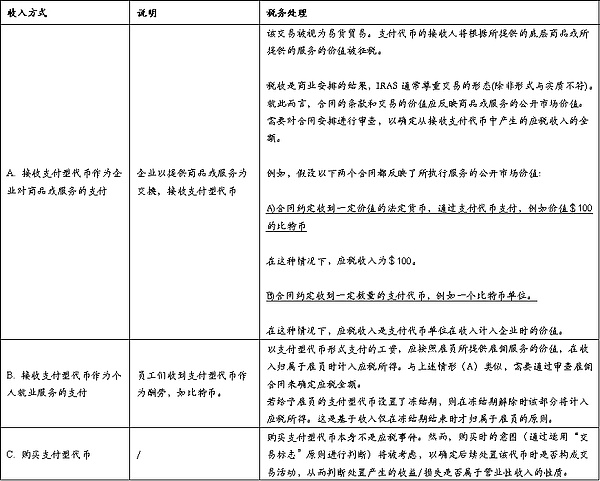
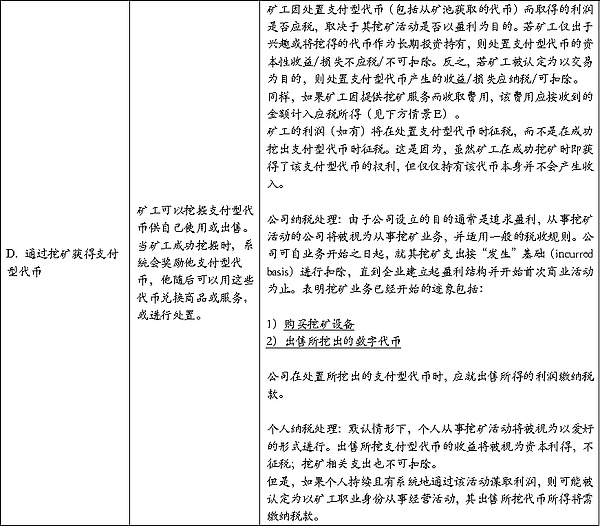
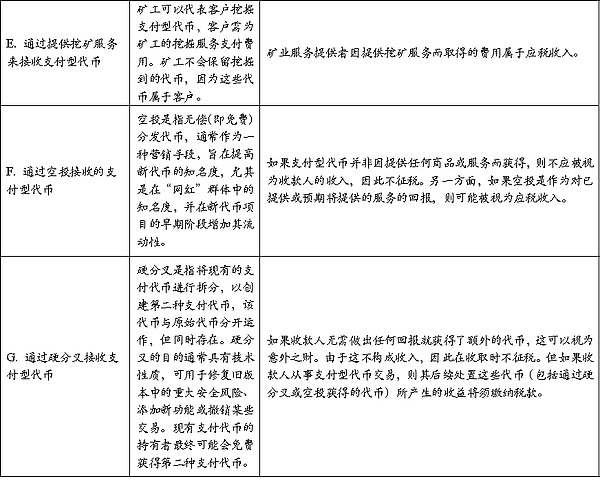
Table 1: Classification and tax treatment of payment tokens under income tax
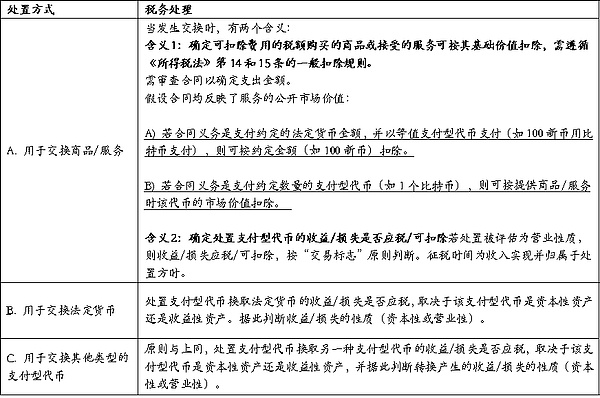
Table 2: Tax treatment under different disposal methods
2. Tax processing of functional tokens
Functional tokens give token holders an explicit or implicit right to use or benefit from a particular product or service that can be used to exchange for those goods or services.
Its forms are diverse, such as: similar vouchers (giving the holder the right to obtain services from the ICO company in the future), or keys (giving the holder the right to access the ICO company platform).When a person (hereinafter referred to as “User”) obtains a functional token to exchange goods or services in the future, the expenses incurred by the user to purchase the functional token will be considered as an advance payment.According to the tax deduction rules, when tokens are used to exchange goods or services, they can be deducted based on the amount of expenditure that has been incurred.
The tax treatment of the issuance of functional tokens during the ICO will be explained in the tax treatment of the ICO in Part IV.
3. Tax processing of securities tokens
Securities tokens give token holders part of ownership or rights over a underlying asset, and usually have explicit or implicit control or economic interests.The more common type of securities tokens currently issued is to be recorded in debt or equity form.However, since securities tokens are essentially tokenized forms of traditional securities, they may also take the form of other securities or investment assets/instruments, such as units in a Collective Investment Scheme.The nature of the securities token depends on the rights and obligations associated with it, which will further determine the nature of the income obtained by the holder, which may be interest, dividends or other distributions and are subject to taxation by the holder.
When a holder disposes a securities token, the tax treatment of its disposal income/losses depends on whether the securities token is a capital asset or a profit asset for the holder.Accordingly, the income/loss will be treated as capital nature or business nature income, respectively.
Securities tokens are as loose as other securities in Singapore, and will not impose taxes on securities tokens that belong to capital assets.Depending on the issuer of securities tokens, income such as dividends belonging to the income asset category is taxed.
4. Tax processing of ICO
ICO is the initial token issuance, involving the issuance of a new token that is usually issued in exchange for other payment tokens, or in some cases in fiat currency.ICOs are often used by token issuers to raise funds or provide means to gain access to specific goods or services in existing or future.
The taxable nature of ICO financing proceeds in the hands of token issuers depends on the rights and functions attached to the tokens issued to investors:
-
Whether the amounts obtained from issuing payment tokens should be taxable depends on the specific facts and situations;
-
The proceeds from issuing functional tokens are usually considered deferred income;
-
The proceeds from issuing securities tokens are similar to those from issuing securities or other investment assets/instruments. They are capital-based income and are therefore not taxable.
For securities tokens that pay interest, dividends or other distributions, the deduction of such payments on the issuer shall be carried out in accordance with Articles 14 and 15 of the Income Tax Law.
See Table 3 for details.
In addition, the following special circumstances may be faced:
ICO failure: If a company issues functional tokens through ICO and uses the raised funds to develop platforms or services, but fails to deliver them in the end, tax processing will depend on the whereabouts of the funds: If the raised funds are returned to investors, the company does not need to pay tax on the refund amount; if the funds are not returned, it is necessary to judge whether it is a capital transaction or a profit transaction based on the nature of the ICO. The tax authorities will comprehensively consider the company’s main business, the reasons for issuing tokens, and contractual obligations.
Early expenses: Reasonable business expenses incurred by the company’s ICO before formal operation can be declared according to the current preliminary expense deduction rules.Under Article 14U of the Income Tax Act, eligible expenses can be deducted during the base period before opening, and the unused losses can also be carried forward to future years or used through Group Relief.This regulation helps reduce the tax burden on enterprises in the start-up stage.
Founder Token: ICO companies can reserve some tokens to grant to founding developers in recognition of their contributions to token design and implementation.If such “founder tokens” are paid as service remuneration, they are taxable income and are taxable when the founder actually obtains control rights; if there is a lock-in period or restriction period, tax will be calculated at the value at the time of expiration; if it is not obtained for the provision of services, they will not be treated as taxable income.
Tip: The Singapore Taxation Authority (IRAS) clearly requires taxpayers to properly preserve complete transaction records related to digital tokens and provide them if necessary.These records should include the transaction date, the number of tokens received or sold, the value and exchange rate of the token at the time of transaction, the purpose of the transaction, customer or supplier information (applicable to trading transactions), ICO details and receipts or invoices for business expenses, etc.These materials are not only the basis of tax declaration, but also an important certificate for responding to tax reviews and ensuring compliance.
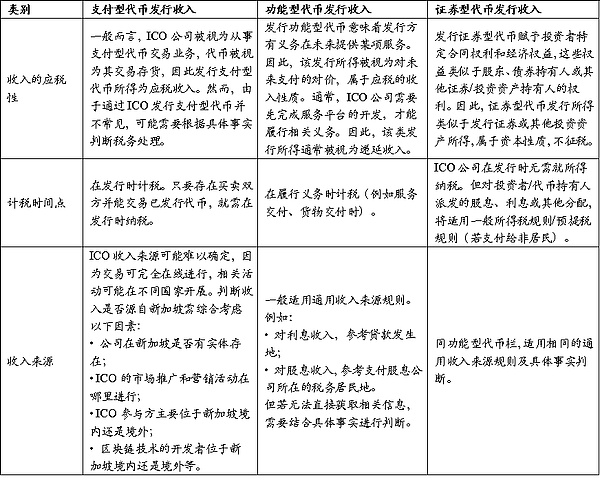
Table 3: Taxable situations for different types of tokens
(II) GST goods and service tax
Goods and Services Tax (GST) is the main form of indirect tax implemented in Singapore since 1994. It broadly falls into the category of Consumption Tax because it is a tax on final consumption, but is essentially a VAT, which is levied on the supply of most goods and services and imported goods at a unified tax rate.As of 2024, the standard GST tax rate is 9%.GST is collected and paid by enterprises and is suitable for domestic transactions and cross-border digital services. Some financial services, exports and specific international services are subject to tax exemption or zero tax rate treatment.
On August 3, 2022, IRAS released a new version of GST: Digital Payment Tokens (first edited on November 19, 2019), which stipulates the treatment of consumption tax for transactions of digital tokens and cryptocurrencies (hereinafter referred to as digital payment tokens).
The core change is that from January 1, 2020, GST exemption will be implemented on the supply of qualified digital payment tokens (DPTs) to avoid double taxation in the two links of token purchase and use.This adjustment significantly reduces the tax friction between cryptocurrencies in payments and transactions, and enhances Singapore’s competitiveness as a crypto-friendly jurisdiction.However, it should be noted that this tax exemption is limited to circumstances that meet the DPT definition and does not affect the normal collection of taxable items such as related intermediary service fees and platform fees.
In the specific rules, IRAS first strictly limits the definition of DPT and clarifies token categories that do not fall within the tax exemption range (such as utility tokens, securities tokens, closed virtual currencies, etc.).Subsequently, the guide distinguishes different types of tokens and their GST processing methods in transactions, redemption, payment and other business links.For example, the transaction, redemption and payment behavior of compliant DPT can enjoy tax exemption, but the related services provided by platform operations, wallet custody, payment intermediaries, etc. still need to be calculated based on the taxable supply of GST.Through this dual judgment of “by asset attribute + business type”, Singapore maintains tax fairness while minimizing tax obstacles to crypto transactions.
1. Dividing digital payment tokens
The guide stipulates that the digital payment token DPT is a digital value representation with all the following characteristics:
(a) Expressed in unit form;
(b) Interchangeable in design (homogeneity);
(c) not denominated in any currency and the issuer does not peg it to any currency;
(d) may be transferred, stored or traded electronically;
(e) It is, or intended to be, a medium of exchange accepted by the public or part of the public, and there are no material limitations when used as consideration.
However, digital payment tokens do not include the following situations:
(f) legal currency;
(g) If a supply may be considered a tax-exempt supply under Part I of Fourth Schedule and is not the reason why the supply itself is a digital payment token with the characteristics (a) to (e) mentioned above, the supply does not belong to a digital payment token;
(h) Any matter that grants the right to receive or instruct a particular person or group to provide goods or services and is no longer used as a medium of exchange after that right is used.
IRAS lists typical DPTs, including Bitcoin, Ether, Litecoin, Dash, Monero, Ripple and Zcash. These tokens all have core characteristics such as homogeneity, non-anchoring of any fiat currency, electronic transferability and as a publicly recognized medium of exchange.In addition, tokens like IdealCoin that can be used as payment within a specific smart contract framework and can be used freely outside the framework, as well as tokens like StoreX that can continue to be circulated as payment methods even after exercising some specific rights, also meet the definition of DPT.
In contrast, situations that do not belong to DPT include: Stablecoins, which do not meet the requirements of homogenization and non-anchoring because their value is anchored to fiat currency; virtual collections such as CryptoKitties do not have homogenization characteristics because they are not completely interchangeable; game points or virtual currencies used in a specific environment; and points or loyalty points issued by retailers and platforms that can only be exchanged for specific goods or services. These tokens cannot serve as a wide media of exchange for the public.
There are also some cases that look similar to DPT at first, but are excluded under certain conditions.For example, StoreY tokens were originally designed as the only payment method for purchasing distributed file storage services, but after the user exercised that specific interest, the token no longer had the function of a medium of exchange and therefore no longer complies with the DPT definition.
For more detailed rules, characteristics and case descriptions, please refer to Section 5 of this guide (especially paragraphs 5.2–5.13 and examples).
2. General trading rules for digital payment tokens
When a DPT is used as a means of paying for goods or services (but not including exchanges into fiat currency or other DPT), the payment act itself is not considered a supply and therefore no GST is levied.Payers do not need to pay GST when paying with DPT, but if the payee has registered with GST, the payment tax shall be calculated for the goods or services it provides unless the supply is tax-free, zero-tax or is not within the scope of taxation.For example, if a GST registered company A uses Bitcoin to purchase software, A does not need to pay GST for the transferred Bitcoin, but if the seller company B is a GST registrant, it needs to calculate GST for the software.
Secondly, the exchange between DPT and fiat currency, as well as the exchange between one DPT and another, are tax-free supplies and do not require GST.However, the company must still list the relevant transactions as tax-free supply when filing and report net realized gains or losses.For example, if Company C exchanges Bitcoin for Ethereum, neither party has to pay GST, but only needs to be processed as a tax-free supply in the report.
In addition, if a GST registered company issues DPT through an initial token issuance (ICO) and exchanges it for fiat currency, the proceeds from the issuance are also considered tax-free supplies and should be declared as tax-free income in the GST statement.For example, Company E issues DPT and sells it to the public in Singapore dollars, with the income from the SGD as tax-free supply income.
Finally, DPT loans, advances or credit arrangements are also tax-free supplies, and relevant interest income does not require GST, but must be reported as tax-free income in the declaration.For example, Company F lends DPT and collects interest, which is listed as a tax-free supply in the GST declaration.
Table 4 illustrates how to determine the supply amount, supply time and specific rules for the customer’s location in transactions involving digital payment tokens.
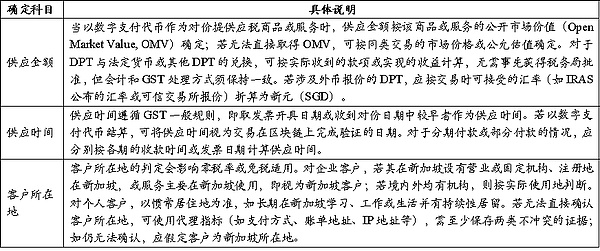
Table 4: Determination of each accounting subject
3. Specific business scenario rules
(1) Mining
In general mining process, miners provide computing power or verification services to the blockchain network, but they have no direct relationship with the party to the transaction being served, and the party who pays the block reward/miner fees cannot be identified.Therefore, obtaining digital payment tokens generated by mining (such as block rewards) does not constitute a “supply” in the sense of GST, and there is no need to calculate GST for the acquisition of behavior.
However, if the miner provides paid services to the identifiable counterparty (such as charging commissions, transaction fees, computing power rental fees, etc. as agreed), it is a taxable service supply.If a miner is a GST registrant, he shall calculate and declare the tax at the standard tax rate; he shall only be treated with zero tax rate only when the zero tax rate condition is met.If the location of the counterparty cannot be reasonably determined, it should be handled at the standard tax rate.
Subsequent disposal of mined tokens: From January 1, 2020, miners sell or transfer the mined digital payment tokens to customers belonging to Singapore, which is a tax-free supply; if miners use the mined tokens to purchase goods or services, it is not considered as “supply tokens” without taxing part of the token (the goods/service suppliers are still taxed according to their rules).
(2) Intermediary
Services provided by intermediaries related to digital payment tokens, even if they involve token transactions, are still taxable.If the intermediary has registered a GST, whether it needs to report token sales in the GST declaration depends on whether it acts as a “principal” or an “agent” in the transaction.If the token is sold as a principal, the sale must be declared as its own supply; if the token is sold as an agent on behalf of the customer, the sales should not be included in its own supply, but should only be included in the supply or the difference charged in the transaction and declare the GST (unless the supply is subject to zero tax rate).When judging one’s own identity, intermediary institutions should conduct self-evaluation based on indicators such as contract responsibility and risk assumption, payment obligations, price decision rights and token ownership.
(3) Rules for handling input tax deduction and reverse charge
During the operation, an enterprise can only apply for input tax deduction for expenditures used for taxable supply; if the expenditure is used for tax-free supply (if digital payment tokens are used to exchange legal currency or other tokens), it cannot be deducted.If the expenditure involves both taxable and tax-free supply, or involves the overall operation of the enterprise, it needs to be distributed according to proportion.For enterprises that provide both taxable and tax-free supply (if some businesses involve digital payment token exchange), the input tax should be allocated and attributable to the input tax, like other tax-free companies, unless the De Minimis Rule is met, and the supply of digital payment tokens can be regarded as an accompanying tax-free supply when relevant conditions are met.Finally, as some duty-free enterprises, if they obtain services or low-value goods from overseas suppliers, they may still have to bear the obligation of reverse charging and should refer to the relevant guidelines of the Singapore Taxation Bureau.
4. Frequently Asked Questions
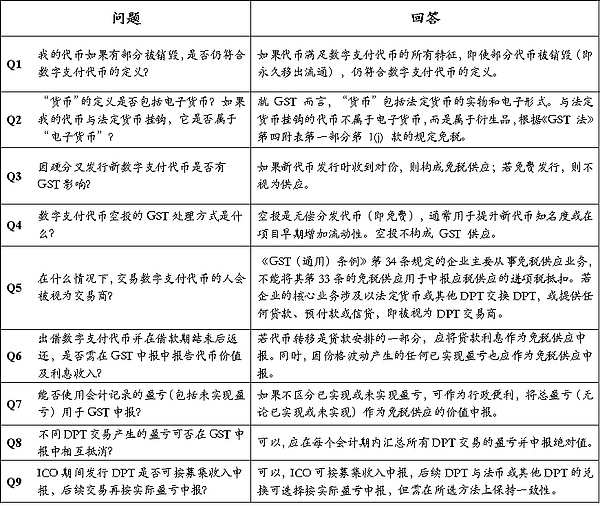
Table 5: Common Q&A
(III) Divided by usage activities
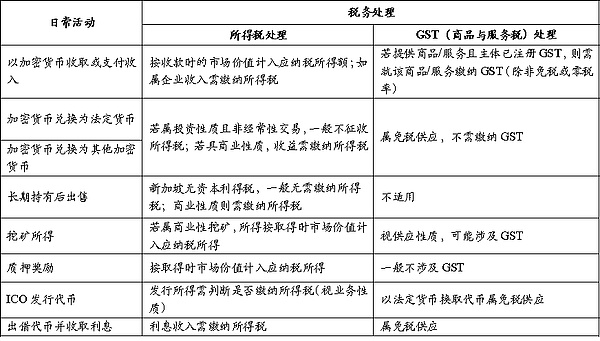
Table 6: Dividing of taxable situations for daily use activities
(IV) Other tax types
Globally, most countries generally define cryptocurrencies as illegal currencies, so the major taxes associated with them usually include income tax, value-added tax or consumption tax.In the previous article, we have summarized the main tax rules for cryptocurrencies in daily holding and use activities in Singapore in the section on Income Tax and Goods and Services Tax (GST).In contrast, the remaining tax types are less correlated with the daily application of cryptocurrencies and will not be added.






